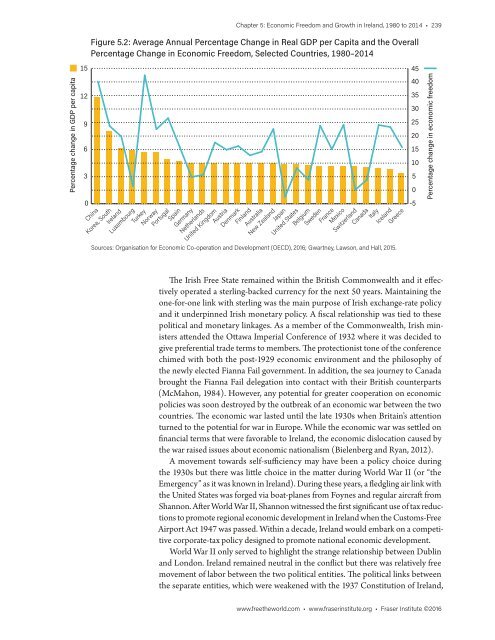Economic Freedom of the World
economic-freedom-of-the-world-2016
economic-freedom-of-the-world-2016
You also want an ePaper? Increase the reach of your titles
YUMPU automatically turns print PDFs into web optimized ePapers that Google loves.
Percentage change in GDP per capita<br />
15<br />
12<br />
9<br />
6<br />
3<br />
0<br />
Chapter 5: <strong>Economic</strong> <strong>Freedom</strong> and Growth in Ireland, 1980 to 2014 • 239<br />
Figure 5.2: Average Annual Percentage Change in Real GDP per Capita and <strong>the</strong> Overall<br />
Percentage Change in <strong>Economic</strong> <strong>Freedom</strong>, Selected Countries, 1980–2014<br />
China<br />
Korea, South<br />
Ireland<br />
Luxembourg<br />
Turkey<br />
Norway<br />
Portugal<br />
Spain<br />
Germany<br />
Ne<strong>the</strong>rlands<br />
United Kingdom<br />
Austria<br />
Denmark<br />
Finland<br />
Australia<br />
New Zealand<br />
Japan<br />
United States<br />
Belgium<br />
Sweden<br />
France<br />
Mexico<br />
Switzerland<br />
Canada<br />
Italy<br />
Iceland<br />
Greece<br />
Sources: Organisation for <strong>Economic</strong> Co-operation and Development (OECD), 2016; Gwartney, Lawson, and Hall, 2015.<br />
The Irish Free State remained within <strong>the</strong> British Commonwealth and it effectively<br />
operated a sterling-backed currency for <strong>the</strong> next 50 years. Maintaining <strong>the</strong><br />
one-for-one link with sterling was <strong>the</strong> main purpose <strong>of</strong> Irish exchange-rate policy<br />
and it underpinned Irish monetary policy. A fiscal relationship was tied to <strong>the</strong>se<br />
political and monetary linkages. As a member <strong>of</strong> <strong>the</strong> Commonwealth, Irish ministers<br />
attended <strong>the</strong> Ottawa Imperial Conference <strong>of</strong> 1932 where it was decided to<br />
give preferential trade terms to members. The protectionist tone <strong>of</strong> <strong>the</strong> conference<br />
chimed with both <strong>the</strong> post-1929 economic environment and <strong>the</strong> philosophy <strong>of</strong><br />
<strong>the</strong> newly elected Fianna Fail government. In addition, <strong>the</strong> sea journey to Canada<br />
brought <strong>the</strong> Fianna Fail delegation into contact with <strong>the</strong>ir British counterparts<br />
(McMahon, 1984). However, any potential for greater cooperation on economic<br />
policies was soon destroyed by <strong>the</strong> outbreak <strong>of</strong> an economic war between <strong>the</strong> two<br />
countries. The economic war lasted until <strong>the</strong> late 1930s when Britain’s attention<br />
turned to <strong>the</strong> potential for war in Europe. While <strong>the</strong> economic war was settled on<br />
financial terms that were favorable to Ireland, <strong>the</strong> economic dislocation caused by<br />
<strong>the</strong> war raised issues about economic nationalism (Bielenberg and Ryan, 2012).<br />
A movement towards self-sufficiency may have been a policy choice during<br />
<strong>the</strong> 1930s but <strong>the</strong>re was little choice in <strong>the</strong> matter during <strong>World</strong> War II (or “<strong>the</strong><br />
Emergency” as it was known in Ireland). During <strong>the</strong>se years, a fledgling air link with<br />
<strong>the</strong> United States was forged via boat-planes from Foynes and regular aircraft from<br />
Shannon. After <strong>World</strong> War II, Shannon witnessed <strong>the</strong> first significant use <strong>of</strong> tax reductions<br />
to promote regional economic development in Ireland when <strong>the</strong> Customs-Free<br />
Airport Act 1947 was passed. Within a decade, Ireland would embark on a competitive<br />
corporate-tax policy designed to promote national economic development.<br />
<strong>World</strong> War II only served to highlight <strong>the</strong> strange relationship between Dublin<br />
and London. Ireland remained neutral in <strong>the</strong> conflict but <strong>the</strong>re was relatively free<br />
movement <strong>of</strong> labor between <strong>the</strong> two political entities. The political links between<br />
<strong>the</strong> separate entities, which were weakened with <strong>the</strong> 1937 Constitution <strong>of</strong> Ireland,<br />
45<br />
40<br />
35<br />
30<br />
25<br />
20<br />
15<br />
10<br />
5<br />
0<br />
-5<br />
Percentage change in economic freedom<br />
www.free<strong>the</strong>world.com • www.fraserinstitute.org • Fraser Institute ©2016


